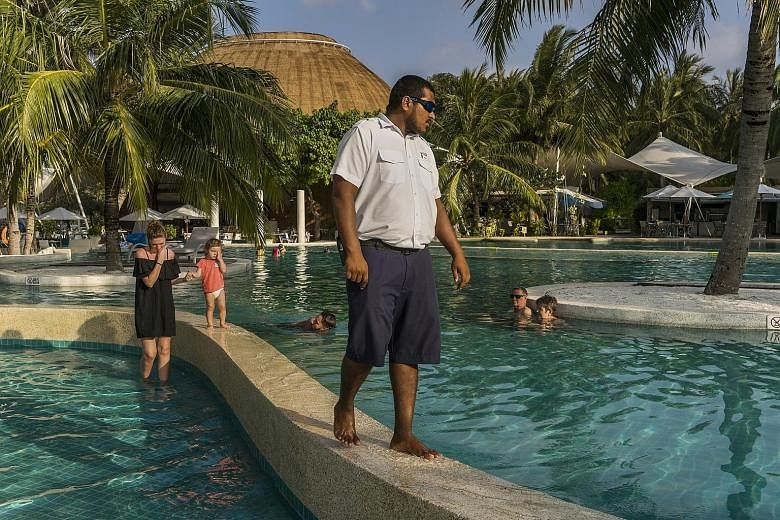MALE (Maldives) • This island paradise made news recently for a reason other than its pristine beaches and high-end resorts: the gruesome killing of a liberal blogger, stabbed to death by multiple assailants.
The killing in April of Mr Yameen Rasheed, 29, a strong voice against growing Islamic radicalisation, has amplified safety concerns - particularly for the foreign tourists that the islands' economy depends on.
It is no idle threat in a country that, by some accounts, supplies the world's highest per capita number of foreign fighters to extremist outfits in Syria and Iraq.
Last summer, the Maldivian government introduced the country's first state policy on terrorism, calling for increased safety awareness at resorts as well as security assessments at seaports and airports.
In January, the Islamic Ministry released recommendations that included instructing tourism companies to provide visitors with written rules on how to conduct themselves in a Muslim country.
But critics say these initiatives are cosmetic, doing little to standardise safety policies, and came only after international stakeholders pressured the Maldivian authorities to acknowledge the threat that extremism poses to visitors.
The Maldives' unusual approach to tourism, in which a single island houses a single resort with only one access point, has also meant that entire islands without robust security teams are vulnerable to seizure.
A group of about 1,200 islands in the Indian Ocean, the Maldives hosted 1.2 million visitors last year.
It was governed as a moderate Islamic nation for three decades under then President Maumoon Abdul Gayoom. But after a transition to democracy in 2008, space opened up for greater religious expression, and conservative ideologies like Salafism cropped up.
"You can't say all of Salafism is radical Islam," said Dr Azra Naseem, a Maldivian researcher on extremism at Dublin City University. "But it's a form of Islam that's been brought into the Maldives from Saudi Arabia and other places. Now, it's being institutionalised, because everybody in the universities, in the Islamic Ministry, they are all spreading this form of Islam."
The last major attack in which foreigners were hurt was almost a decade ago when militants set off a homemade bomb in the capital, Male. Last year, two resorts were robbed by masked intruders.
But Mr Ismail Ali, a police spokesman, told The Maldives Independent newspaper that such robberies are often inside jobs. Gaining access to most of the islands, he added, is relatively simple.
"There are security posts set up to monitor who comes on and off the island," he said. "But it's fairly easy to enter from other sides as well."
Security experts say many resorts are ill equipped to fend off an attack like those that have occurred in places like Tunisia and Bali.
Mr Abeer Ismail, information officer at the Ministry of Tourism, said that as far as he knew, no safety concerns had been raised officially by any resorts.
NYTIMES

